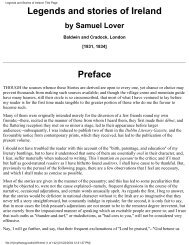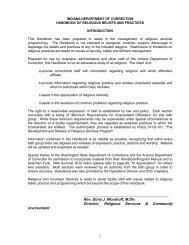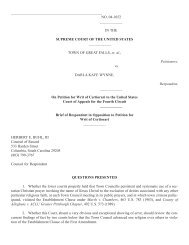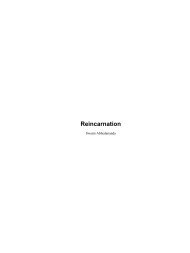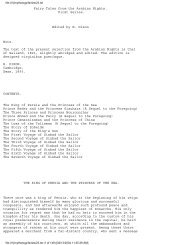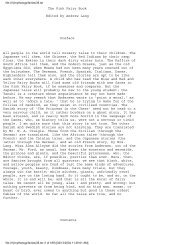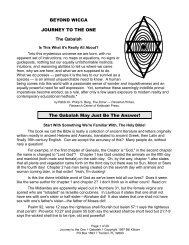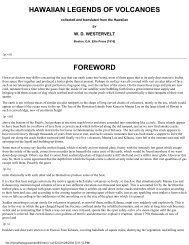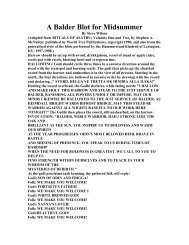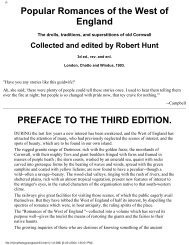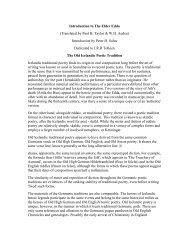Irish Druids And Old Irish Religions PREFACE CONTENTS
Irish Druids And Old Irish Religions PREFACE CONTENTS
Irish Druids And Old Irish Religions PREFACE CONTENTS
Create successful ePaper yourself
Turn your PDF publications into a flip-book with our unique Google optimized e-Paper software.
It is not easy to laugh at <strong>Irish</strong> peasants for ghost yarns when all nations, from the remotest antiquity, accepted them, and philosophers like<br />
Dr. Johnson, preachers like John Wesley, reformers like Luther, poets like Dante and Tasso, recognized such spirits. Some, like an author<br />
in 1729, may doubt souls returning from heaven--"Nor do<br />
p. 97<br />
I know," said he, "whether it would be worth their shifting Hell, and coming back to this world in the wandering condition those things<br />
called Ghosts are understood to be." Others may exclaim with Dr. Johnson, "All argument is against it, but all belief is for it."<br />
Thyræus, the Jesuit, thinks that they are but souls from purgatory, seeking rest. Earberg considered, "It is against no Scripture that souls<br />
should come from Hades." Henri Martin, the French Celtic scholar, said, "The intercourse between earth and heaven is a belief strongly<br />
accredited among the Bards." Gladstone recognizes that the recent Greek dead "are wanderers in the Shades, without fixed doom or<br />
occupation." Homer's Odyssey has this reference--<br />
"But swarms of spectres rose from deepest hell,<br />
With bloodless visage and with hideous yell.<br />
They scream, they shriek, and groans and dismal sounds<br />
Stun my scared ears and pierce hell's utmost bounds."<br />
Virgil shows to Æneas his father Anchises--<br />
"Then thrice around his neck his arms he threw;<br />
<strong>And</strong> thrice the flitting shadow slipp'd away,<br />
Like wind or empty dreams that fly the day."<br />
Suetonius tells us that the ghost of Caligula walked in Lavinia's garden, where his body was buried, until the house was burnt down.<br />
Ecclesiasticus (chap. xlvi.) speaks of Samuel thus: "<strong>And</strong> after his death he prophesied, and showed the king his end." In the archives of the<br />
Royal Society is a MS. paper, read November 16, 1698, on some "Apparitions in y e N. of Scotland," in which we are informed that Mr.<br />
Mackeney, A.M., Oxford, "said that they saw apparitions almost every week; and upon his knowledge they did very frequently foretell the<br />
death of Persons, w ch always succeeded accordingly."<br />
Were all these mistaken? Were they under the influence of Herbert Spencer's Organ of Reviviscence, or Wonder-Organ,<br />
p. 98<br />
which "affords a tangible explanation of mental illusions"?<br />
The <strong>Irish</strong>, like the ancient Jews, held that bad men, especially, could walk this earth after death; and the English law, almost to our day,<br />
allowed a stake to be driven through the body of suicides and murderers, to prevent their spirit troubling the living.<br />
The Church has had its say in the matter. The Council of Elvira, A.D. 300, forbade the lighting of tapers in cemeteries, as that was apt to<br />
disturb the souls of Saints; so said the Council of Iliberit. St. Basil was told by a ghost that he had killed Julian. Both Ignatius and<br />
Ambrose were said to have appeared to their disciples. No Church has ever denied the existence and appearance of ghosts, and none<br />
opposed exorcism in some form or other.<br />
"<strong>Irish</strong> pagans," observes Nicolas O'Kearney, "never dreamed of spirits after death having assumed such forms (misty ghosts). The spirits<br />
from Elysium always appeared in their proper shape, and spoke and acted as if they were still in the enjoyment of mortal life."<br />
In this respect he differs from Macpherson's Ossian. The opinion is, also, opposed to other descriptions in recognized <strong>Irish</strong> poems of<br />
antiquity. In the poem Cathluina, as translated in Ireland's Mirror, is this:--"Ferarma, bring me my shield and spear; bring me my sword,<br />
that stream of light. What mean these two angry ghosts that fight in air? The thin blood runs down their robes of mist; and their<br />
half-formed swords, like faint meteors, fall on sky-blue shields. Now they embrace like friends. The sweeping blast pipes through their<br />
airy limbs. They vanish. I do not like the sight, but I do not fear it."<br />
The Inverness Gaelic Society had a paper by Donald Ross on this subject, saying, "Spectres hovered gloomily over the reedy marsh or the<br />
moor, or arrayed themselves<br />
p. 99<br />
on the blasts of the wind; and pale ghosts, messengers of the unseen world, brought back the secrets of the grave." A Gaelic song has the<br />
following--"In a blast comes cloudy death, and lays his grey head low. His ghost is rolled on the vapours of the fenny field." Henri Martin<br />
speaks of "harps of bards, untouched, sound mournful over the hill."<br />
Some ghosts were material enough. That of St. Kieran, of Clonmacnoise, managed to strike King Felim, the plunderer of his church, so<br />
effectually, with his ghostly crozier, as to give an internal wound, of which the chief died. When Finn or Fionn appeared to Osgar, on the<br />
battle-field of Gabhra, it is affirmed that "his words were not murmurs of distant streams," but loud and clear.<br />
But the Fetch, as recognized in the scattered poems collected, or revised, in Macpherson's Ossian, is more a spirit of the air. Some of the<br />
descriptions, relating to the ghosts of Erin and Argyle, are striking:--<br />
file:///I|/mythology/witchcraft/8/8.html (36 of 114) [02/05/2004 8:38:14 AM]



